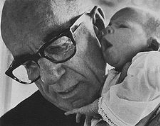
pediatrician
whose book Baby and Child Care
, published in 1946, is one of the biggest best-sellers of all time. Its message to mothers is that "you know more than you think you do."
Spock was the first pediatrician to study psychoanalysis
to try to understand children's needs and family dynamics. His ideas about childcare influenced several generations of parents to be more flexible and affectionate with their children, and to treat them as individuals.
I really learned it all from mothers.![]()
I've come to the realization that a lot of our problems are because of a dearth of spiritual values.![]()
People have said, "You've turned your back on pediatrics." I said, "No. It took me until I was in my 60s to realize that politics was a part of pediatrics." ![]()
I would say that the surest measure of a man's or a woman's maturity is the harmony, style, joy, and dignity he creates in his marriage, and the pleasure and inspiration he provides for his spouse.![]()
You know more than you think you do.![]()
Don't take too seriously all that the neighbors say. Don't be overawed by what the experts say. Don't be afraid to trust your own common sense.
![]()
The more people have studied different methods of bringing up children the more they have come to the conclusion that what good mothers and fathers instinctively feel like doing for their babies is the best after all. All parents do their best job when they have a natural, easy confidence in themselves. Better to make a few mistakes from being natural than to try to do everything letter-perfect out of a feeling of worry.
![]()
The fact is that child rearing is a long, hard job, the rewards are not always immediately obvious, the work is undervalued, and parents are just as human and almost as vulnerable as their children.
![]()
There are only two things a child will share willingly— communicable diseases and his mother's age.
![]()
In automobile terms, the child supplies the power but the parents have to do the steering.
![]()

